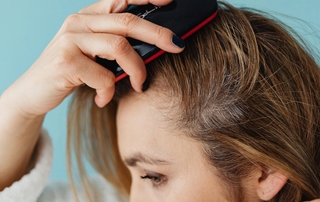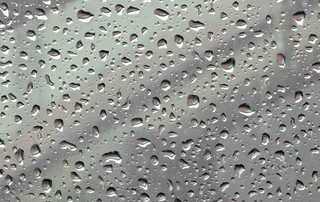A healthy scalp is essential for overall comfort and wellbeing. But when irritation strikes, it can be difficult to ignore. Itching, flaking, redness or a persistent tight feeling are all signs that your scalp needs some extra care and attention. Understanding what causes scalp irritation, and how to prevent or manage it, is the first step to restoring scalp health. In this guide, we’ll explore the most common triggers of scalp irritation, along with practical tips on how to avoid them.
Common causes of an itchy scalp
Hard water
Around 60% of the UK has hard water, which is naturally high in minerals like calcium and magnesium. When you wash your hair in hard water, these minerals don’t fully rinse away. Instead, they can build up over time, leaving residue on your scalp and hair.
Hard water can:
- Dry out your scalp
- Lead to itching and irritation
- Increase build-up, causing flaking or dandruff-like symptoms
How to avoid it: Installing a shower filter can help to reduce mineral deposits in your water. If your scalp feels particularly uncomfortable or you can’t install a shower filter, rinse your hair with filtered or bottled water as the final step.
Product build-up
Many hair care products – like styling gels, sprays and even some conditioners – can leave behind residue on the scalp. Over time, this build-up mixes with natural oils and dead skin cells, making the scalp feel itchy, flaky or uncomfortable. In some cases, it can even contribute to scalp breakouts or irritation.
How to avoid it: Use only what your hair needs. Too much product leads to more build-up, resulting in that uncomfortable itch. Wash your hair regularly, especially if you use styling products daily, and incorporate a scalp-friendly cleanser with a gentle formula to break down build-up without stripping the scalp of its natural oils.
Dandruff
Dandruff is one of the most common causes of scalp irritation. It often appears as white flakes on your hair and shoulders and is typically caused by an overgrowth of a natural yeast on the scalp, combined with excess oil and skin cell turnover. While dandruff itself isn't harmful, it can be itchy and uncomfortable.
How to avoid it: Wash your hair regularly to prevent oil build-up, being careful not to overwash. Avoid heavy, oily styling products that can encourage the yeast linked to dandruff to grow. Managing stress is also important, as stress can make dandruff symptoms worse.
Allergic reactions
Scalp irritation isn’t always caused by lifestyle or environmental factors – it can be caused by an allergic response. Ingredients in shampoos, conditioners, hair dyes or styling products can trigger sensitivity in certain people. Common culprits include sulfates, parabens, artificial fragrances and even some natural essential oils. When your scalp reacts, it may feel itchy, red or sore, and you might notice small bumps or increased flaking.
Switching to a gentle, scalp-friendly cleanser can help soothe irritation while washing away allergens or residues that may have built up.
How to avoid it: Always patch test new products before applying them to your scalp. If you have known sensitivities, look for fragrance-free or hypoallergenic formulas. Read product labels carefully and avoid products containing ingredients you know trigger reactions. If irritation persists, consult a dermatologist for advice.
Scalp conditions
Scalp irritation is sometimes linked to underlying skin conditions rather than just external triggers. These conditions can be long-term and may flare up periodically, making the scalp feel sore, itchy or flaky. Understanding them can help you manage symptoms more effectively.
The most common scalp conditions include:
- Psoriasis: This autoimmune condition speeds up skin cell turnover, leading to thick, scaly patches on the scalp. These plaques can be itchy, sore, and prone to flaking.
- Seborrhoeic dermatitis: A common condition often mistaken for dandruff. It causes red, inflamed patches and greasy-looking scales that may flake off. Stress, cold weather, and excess oil production can worsen symptoms.
- Eczema (atopic dermatitis): This often results in dry, itchy, and inflamed patches. It can be triggered by allergens, stress, or even temperature changes.
How to avoid it: While you may not be able to prevent these conditions entirely, you can reduce flare-ups with consistent care. That means avoiding harsh shampoos or styling products containing alcohol, sulfates or strong fragrances and keeping your scalp moisturised. You should also protect your scalp from extreme weather changes and avoid stress wherever possible.
Stress
Stress doesn't just affect your mind – it can manifest physically through your scalp. A stressed scalp may be itchy, tight and more prone to flare-ups of existing conditions.
How to avoid it: Practice relaxation techniques such as meditation, deep breathing or yoga to help manage stress. Supporting your body with a healthy, balanced diet rich in vitamins and minerals can also improve overall wellbeing and help your scalp stay healthy.
Environmental factors
The environment plays a bigger role than you might think when it comes to scalp comfort. Changes in temperature, humidity or air quality can all contribute to irritation.
- Cold weather: Can dry out the scalp.
- High humidity: Can increase oiliness and sweating, making irritation more likely.
- Pollution: Can settle on your scalp, causing build-up and itching.
How to avoid it: Protect your scalp from extreme weather with hats or scarves. Rinse your hair after spending time in polluted environments.
[H2] Final thoughts about scalp irritation
Scalp irritation can stem from many sources, including the environment, lifestyle habits and underlying skin conditions. The good news is, once you identify the trigger, you can take steps to manage and even prevent discomfort.
Simple changes, like reducing overwashing, protecting your scalp from harsh environments and avoiding heavy product build-up, can all make a big difference.
Polytar Scalp Shampoo is a medicated shampoo formulated with 4% coal tar solution. It is used to treat scalp conditions such as psoriasis (thickened patches of inflamed, red skin, often covered by silvery scales), seborrhoeic dermatitis (red, scaly, itchy scalp), eczema (itchy skin rash), itchiness and scaling due to these conditions and dandruff.’ As with all medicines, always read the label before use and consult a healthcare professional if the symptoms persist or worsen.







